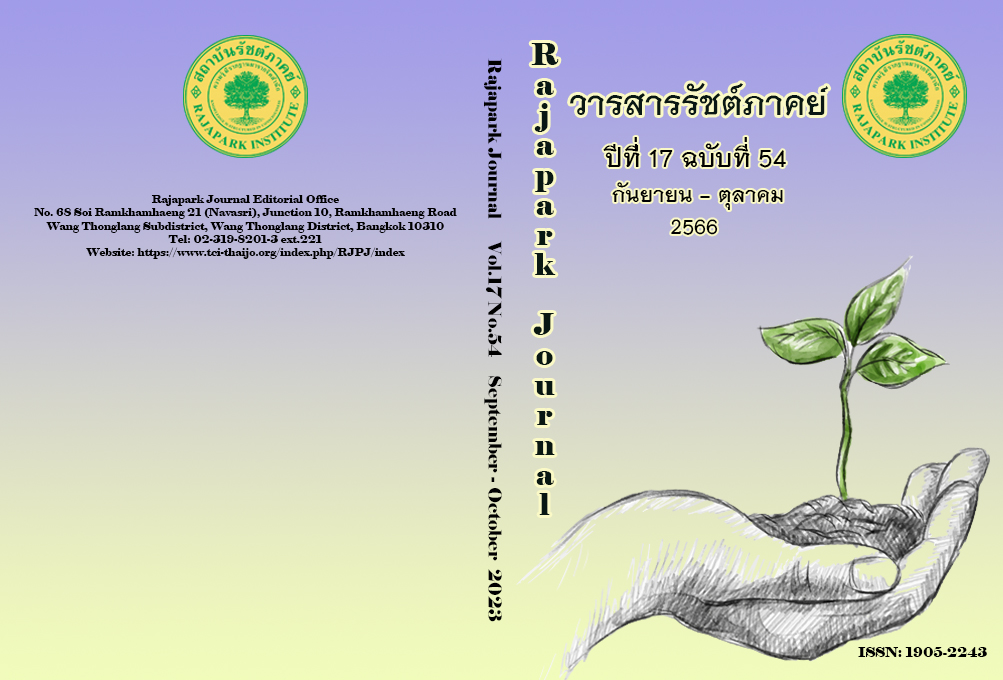A Teamwork Model for Nursing Students, Public Nursing Institutions
Main Article Content
Abstract
This research aimed to 1) study the conditions and problems of teamwork among nursing students in the public educational institutions of nursing 2) create a teamwork model for nursing students; and 3) evaluate the teamwork model for nursing students. The study was divided into three steps, as follows: (1) Study the present situation and problems with the teamwork model for nursing students. The in-depth interviews were conducted with a total of 11 nurse practitioners, head nurses, nurses, and registered nurses. The tool was a semi-structured interview form. The data were used for content analysis. (2) Create a teamwork model for nursing students. The data were collected with 17 experts using the Delphi technique. (3) Assess the teamwork style of nursing students through a group discussion with seven experts to assess its possibility and usefulness. The data were analyzed using content analysis, the mean, and the standard deviation. The results revealed that (1) nursing students lack confidence in communication and are unsure of their role in teamwork. The internship period is limited, so little experience is gained. There is limited time for creativity and development, as well as being unable to improve and develop concrete work. (2) The model of teamwork for nursing students consisted of five components: communication, cooperation, coordination, creativity, and continuous improvement. (3) Experts agreed that all components of the model were appropriate, possible, and useful at the highest level.
Article Details

This work is licensed under a Creative Commons Attribution-NonCommercial-NoDerivatives 4.0 International License.
Views and opinions appearing in the Journal it is the responsibility of the author of the article, and does not constitute the view and responsibility of the editorial team.
References
Al Sabei, S. D., Labrague, L. J., Al-Rawajfah, O., AbuAlRub, R., & Burney, I. A. (2022). Relationship between interprofessional teamwork and nurses' intent to leave work: The mediating role of job satisfaction and burnout. Nursing Forum, 57(4), 568-576.
Allert, C., Dellkvist, H., Hjelm, M., & Andersson, E. K. (2022). Nursing students' experiences of applying problem‐based learning to train the core competence teamwork and collaboration: An interview study. Nursing Open, 9(1), 569-577.
Brewer, M., & Flavell, H. (2020). Teamwork, collaboration and networking: self-reported behavioral change following pre-licensure interprofessional clinical learning. Journal of Interprofessional Care, 34(2), 184-192.
Carson, O. M., Laird, E. A., Reid, B. B., Deeny, P. G., & McGarvey, H.E. (2021). Enhancing teamwork using a creativity-focused learning intervention for undergraduate nursing students: A pilot study. Nurse Education in Practice, 30(9), 20-26.
Eisner, E. (1976). Educational connoisseurship and criticism: Their form and functions in education evaluation. The Journal of Aesthetic Education, 10(3), 135-150.
Fildes, C., Munt, R., & Chamberlain, D. (2022). Impact of dual intensive care unit and rapid response team nursing roles on service delivery in the intensive care unit. Critical Care Nurse, 42(5), 23-31.
Glauberman, G., Wong, L., Bray, M., & Katz, A. R. (2022). Disaster aftermath interprofessional simulation: Promoting nursing students' preparedness for Interprofessional teamwork. Journal of Nursing Education, 59(6), 353-356.
Greene, D. A., & Doss, J. L. (2021). Developing teamwork skills in baccalaureate nursing students: Impact of Team STEPPS training and simulation. International Journal of Nursing Education Scholarship, 18(1), 1-8.
Homtong, W., & Nuangchalerm, P. (2019). Developing Guideline to Enhance Team Working Competency of Teachers. Journal of Roi Et Rajabhat University, 13(3), 149-157.
Karnchanawasee, S. (2019). Evaluation theory (9th ed.). Printing House of Chulalongkorn University.
Lu, M., & Chiu, M.M. (2022). Do teamwork guidelines improve peer assessment accuracy or attitudes during collaborative learning. IEEE Transactions on Education, 65(4), 485-492.
Manokarn, C., Buaphood, S., & Jaiyasit, R. (2019). Team effectiveness of nursing instructors under the ministry of public health. Journal of The Royal Thai Army Nurses, 20(2), 75-82.
Meason, M., Albert, A., & Khedourri, F. (1985). Management, individual and organizational effectiveness (2nd ed.). Harper & Row.
Metkarunjit, M. (2018). Teamwork: The driving force for success. Audial Store.
Ministry of Public Health (MOPH). (2020, May 9). Health System Policy 2020. Retrieved from
http://bps.moph.go.th/new_bps/sites/default/files/17.policy2564.pdf
Mohammad, A. C., Shahzad, P., Leila, M. D., & Sahar, K. (2021). Creativity in nursing care: A concept analysis. Florence Nightingale Journal of Nursing, 29(3), 389–396.
Momthakarn, A. (2020). Big potential: How transforming the pursuit of success raises our achievement, happiness, and well-being. C-education.
Romig, D. A. (1996). Breakthrough teamwork: Outstanding result using structured teamwork. Irwin.
Sriburom, T., & Sriklaup, K. (2023). Designing the guidelines for enhancing teamwork and virtual teamwork skills in office and online professional learning community. CMU Journal of Education, 70(1), 88-102.
Suwannasin, N., & Na-Nan, K. (2019). Teamwork influences the team’s efficiency of Chularat hospital group: Exploratory factor analysis. Journal of Sripratum education Chonburi, 15(4), 100-111.
Topbaş, E. & Üstün, G. (2022). The effect of assertiveness training on teamwork attitudes during epileptic seizure simulation: A randomized controlled study. Archives of Epilepsy, 28(3), 127-133.
Vande, M., Billett, S., Armit, L., Frommolt, V., Mitchell, C., Mitchell, M., Shaw, J., & Grealish, L. (2021). Developing intersubjectivity and teamwork skills through learning circles on clinical placement: A mixed methods study. Nurse Education in Practice, 56, 13-27.
Wai, A., Lam, V., Ng, Z., Pang, M., Tsang, V., Lee, J., & Wong, J. (2021). Exploring the role of simulation to foster interprofessional teamwork among medical and nursing students: A mixed-method pilot investigation in Hong Kong. The Journal of Interprofessional Care, 35(6), 890-898.
Yang, S.Y., Liu, C. & Hsieh, P.L. (2022). Effects of team-based learning on students' teamwork, learning attitude, and health care competence for older people in the community to achieve SDG-3. International Journal of Environmental Research and Public Health, 19(11), 31-44.


